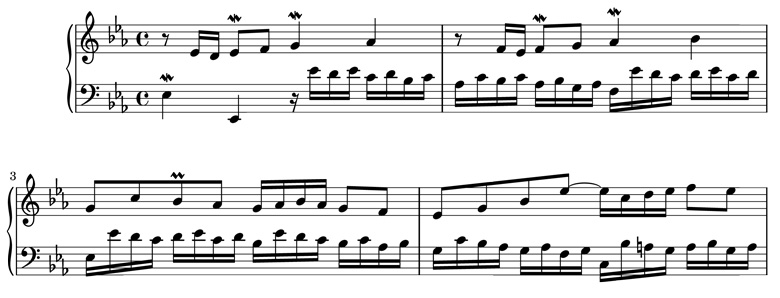Journal of Creation 25(1):40–43, April 2011
Browse our latest digital issue Subscribe
Does music have evolutionary origins?
Review of Musicophilia, Tales of Music and the Brain by Oliver Sacks

Music has fascinated and entertained people across all cultures during all of history. But few of us stop to think, where did music come from? What is its purpose? Can such questions even be answered?
Dr Oliver Sacks, the brilliant neurologist, ambitiously tackles many neurological and experiential aspects of music in his book Musicophilia, Tales of Music and the Brain. Sacks is well known for his popular level collections of case studies of people with neurological disorders, such as The Man Who Mistook His Wife for a Hat.1 His 1973 book Awakenings2 was adapted into an Academy-Award-nominated film3 of the same name in 1990, starring Robin Williams (portraying Sacks) and Robert DeNiro. And his book An Anthropologist on Mars4 catapulted animal behavioral scientist Temple Grandin into fame by describing her case of high functioning autism. One of the stories in this book was the inspiration for the 1999 Val Kilmer film At First Sight, and also helps explain an otherwise puzzling miracle of Christ.5
In Musicophilia, Sacks addresses numerous categories of how the human brain processes music: extreme musical giftedness (and its opposite, amusia) as well as the loss thereof, musical seizures and hallucinations, the use of musical therapy in treating various neurological conditions, such as aphasia, dementia (like Alzheimer’s), Tourette’s syndrome, Parkinson’s disease, and depression. The sheer scope of Musicophilia is impressive, as is the way Sacks relates the case studies and the complex neurological concepts in his characteristically lucid and engaging style.
Music—uniquely and universally human
Throughout Musicophilia, Sacks repeatedly (and correctly) identifies music, like language, as an ability that has developed uniquely (and universally) in humans, as opposed to animals. The very word musicophilia refers to this human propensity for music. In describing the human ability of musical imagery, he writes
“Our susceptibility to musical imagery indeed requires exceedingly sensitive and refined systems for perceiving and remembering music, systems far beyond anything in any nonhuman primate” (p. 42).
Sacks continues by describing specific skills and linking of systems that show up solely and universally in humans:
“The embedding of words, skills, or sequences in melody and meter is uniquely human” (p. 260),
and
“[Such a] linking of auditory and motor systems seems universal in humans, and shows itself spontaneously, early in life” (p. 260).
Sacks also makes this important connection between music and language:
“Language and music both depend on phonatory and articulatory mechanisms that are rudimentary in other primates, and both depend, for their appreciation, on distinctly human brain mechanisms dedicated to the analysis of complex, segmented, rapidly changing streams of sound” (pp. 234–235).
However, “there are major differences (and some overlaps) in the representation of speech and song in the brain” (p. 235). In fact, neurologically speaking, music perception and speech appear to be more different than neurologists and psychologists have been expecting (pp. 111–112, footnote 6). These last two statements are crucial, as we shall see below.
Another unique feature of music that Sacks describes is its power. Numerous chapters of Musicophilia are dedicated to describing the power of music therapy for patients with various neurological disorders. With proper music therapy, Alzheimer’s patients can maintain at least an apparent sense of identity (pp. 372–373). Parkinson’s patients can temporarily reacquire a proper sense of time and movement (pp. 274–282). And at the conclusion of the section on Music, Madness, and Melancholia, Sacks writes,
“Music, uniquely among the arts, is both completely abstract and profoundly emotional. It has no power to represent anything particular or external, but it has a unique power to express inner states or feeling” (p. 329).
What evolutionary method?
In the above contexts, Sacks’ analysis is superb. Unfortunately, like so many evolutionists before him, Sacks stumbles when it comes to describing the origins of music in humanity. In the particular situation of people whose savant-like musical skills emerge as the result of injury or illness to some other part of the brain, Sacks blithely opines,

“One must infer that there are, in many individuals, at least, very concrete eidetic and mnemonic powers [powers related to visual recall and memory in general] which are normally hidden, but which may surface or be released under exceptional conditions. The existence of such potentials is only intelligible in evolutionary and developmental terms, as early forms of perception and cognition which once had adaptive value but are now suppressed and superseded by other forms [emphasis added]” (p. 170).
Although it’s not surprising that Sacks, a self-professed “old Jewish atheist” (p.38), presupposes an evolutionary origin for music, it is disappointing since he spends nearly the entire preface of the book describing how the many speculations of music’s evolutionary origin have failed to give a satisfactory explanation. For example, Darwin’s contemporary Herbert Spencer6 proposed that music emerged in humanity out of emotional or “slightly exalted” speech.7 Darwin, however, completely disagreed with Spencer’s conclusions and believed that music, as a means of sexual selection, preceded speech. As Darwin stated in his Descent of Man,
“It would be altogether opposed to the principle of evolution, if we were to admit that man’s musical capacity has been developed from the tones used in impassioned speech.”8
Not only do these evolutionary explanations contradict each other, but they are in opposition to what Sacks himself has observed and claimed—that language and music are neurologically distinct functions. Even if one could determine which came first, how could they have come one from the other?
Toward what purpose?
Beyond all this, evolutionary psychologists have concluded that music, despite its universality and its power across all cultures, is completely accidental and without purpose. Philosopher and psychologist William James stated, “[The human susceptibility to music] has no zoological utility; it corresponds to no object in the natural environment; it is a pure incident of having a hearing organ [emphasis in original].”9 A century later, evolutionary psychologist Steven Pinker, a music lover himself, wrote,
“What benefit could there be to diverting time and energy to the making of plinking noises? … As far as biological cause and effect are concerned, music is useless … It could vanish from our species and the rest of our lifestyle would be virtually unchanged.”10
Since there is clearly no adaptive advantage to music, evolutionary biologists and psychologists have relied on the concept of exaptation11: a process describing features that, in an evolutionary framework, were originally selected for one purpose but have since been co-opted for a different purpose. Sacks notes the similarity between exaptation and how the brain represents music: “This might go with the fact that there is no single ‘music center’ in the human brain, but the involvement of a dozen scattered networks throughout the brain” (p. xi). In the midst of this discussion, though, Sacks still reveals profound uncertainty about why music exists, while clearly asserting its importance throughout humanity:
“[R]egardless of all this—the extent to which human musical powers and susceptibilities are hardwired or are a by-product of other powers and proclivities—music remains fundamental and central in every culture” (p. xi).
Once again, though we are told over and over that nothing in all of science makes sense except in light of evolution, evolutionists are completely incapable of giving a satisfactory description of the origins and the purpose of something as powerful and as uniquely and universally human as music. They are left, by their own admission, with mere speculation.
The biblical portrayal of music
What can a Christian, guided by the Bible, make of all this? Does the Bible give answers to the origin and purpose of music? Yes, it does.

Because the Bible describes God as the Creator of the entire universe (Genesis 1:1 and Acts 17:24, to name just a couple of references), we might suppose that the origin of music has its origin in God Himself. This is confirmed by Zephaniah 3:17, which states,
“The Lord your God is in your midst, a mighty one who will save; He will rejoice over you with gladness; He will quiet you by His love; He will exult over you with loud singing.”
God Himself sings. And since mankind is made in the image of God (Genesis 1:27 and Genesis 9:6), it makes sense that God would endow mankind with musical ability if God is musical. Furthermore, this ability did not take long to develop, since Genesis 4:21 names Jubal as “the father of all those who play the lyre and pipe” just a few generations removed from Cain, Adam and Eve’s son.
But if God is the origin of music in mankind, does that help explain its purpose? Absolutely. Throughout Scripture, we see music as a primary element of worship. The Old Testament saints were repeatedly commanded, “Sing to the Lord a new song” (Psalm 96:1, Psalm 98:1, Psalm 149:1, and Isaiah 42:10). The last psalm, Psalm 150, is an example of a command to praise the Lord not just vocally but on various musical instruments. New Testament saints are similarly called to address one another in “psalms and hymns and spiritual songs” (Ephesians 5:19 and Colossians 3:16). We even see evidence of the inherent power in music through biblical examples of how it is used in false worship (Daniel 3) and vain worship (Amos 5:23).
Therefore, since all men are commanded to worship God, the Bible explains the importance of the universality of music. Since man alone was made in God’s image, the Bible explains the uniqueness of music in man in contradistinction to the animals. And with music woven into all of worship, even false and vain worship, the Bible explains the power of music.
The power of belief
Since the Bible has such clear and convincing explanatory power regarding the origins and purpose of music, what do we do with an otherwise brilliant scientist like Sacks who has all the questions and can see all the evidence with his own eyes but can’t see the answers? It helps to remember that all operational science—science in the present that gives us medical and technological breakthroughs—can be done without any regard for evolution. In fact, good operational science can even be done without any conscious regard for God and the biblical foundations of science. However, as CMI has plainly shown before, modern science could not exist without the biblical framework of its founders.
But when an operational scientist like Sacks begins to drift into historical science to explain the origin and purpose of music, that’s when his problems arise. Not only is he trusting the stories that evolutionists outside his own field of expertise have woven, he trusts those scientists and their stories against what he can see with his own eyes. One is reminded of the case of paleontologist Mary Schweitzer who, despite observing soft tissue and blood vessels in a T. rex bone, was reluctant to believe what she was seeing with her own eyes, because “the bones, after all, [were] 65 million years old”.12 The power of belief is so strong, scientists like Sacks and Schweitzer are willing to stand against everything they can observe and all the other science they know for the sake of their evolutionary belief system.
In the case of Sacks, not only is he unable to see the true answer in historical terms, his belief system hinders his treatment of some of his patients. One of his patients, a medical doctor (and non-musician) who had been struck by lightning, reported having an out-of-body experience while unconscious and near death from the strike, after which he began to crave piano music. Soon after that, he began to hear or imagine piano music in his head that he obsessively felt the need to write down. Within months, this medical doctor and family man was consumed by a passion to compose and perform the piano music he was hearing. No physical explanation had been found, and this doctor had begun to see his sudden musicophilia as a spiritual experience, something he was ‘brought back to life’ for.
When asked for an explanation, Sacks replied:
“ … with no disrespect to the spiritual, I felt that even the most exalted states of mind, the most astounding transformations, must have some physical basis or at least some physiological correlate in neural activity” (p. 12).
Regarding near-death and out-of-body experiences in general (cf. CMI’s explanation), Sacks writes:
“Experiences like this are not easily dismissed by those who have been through them, and they may sometimes lead to a conversion or metanoia, a change of mind, that alters the direction and orientation of a life. One cannot suppose, any more than one can with out-of-body experiences, that such events are pure fancy; very similar features are emphasized in every account. Near-death experiences must also have a neurological basis of their own, one which profoundly alters consciousness itself [emphasis added]” (pp. 14–15).
Sacks’ commitment to a material explanation goes beyond merely seeking a physiological correlate. He assumes these experiences must be caused by some neurological basis. But such near-death experiences sound amazingly like those described by people who claim to have been abducted by aliens.13 Is completely dismissing the spiritual realm in such cases really a wise idea, especially given the Bible’s description of music’s role in both true and false worship? At any rate, this is not the first time a naturalistic and/or evolutionary mindset has actually hindered an operational scientist from discovering true and helpful methodologies and treatments.14
Recommended … with reservations
In Musicophilia, Dr. Sacks has provided a thoroughly fascinating journey into music and the mind. Nevertheless, while writing about the origins and purpose of music, he has also given yet another proof of Psalm 118:8—“It is better to trust in the Lord than to put confidence in man.”
References
- Sacks, O., The Man Who Mistook His Wife for a Hat, Summit Books, New York, 1985. Return to text.
- Sacks, O., Awakenings, Doubleday, New York, 1973. Return to text.
- See Awakenings, www.imdb.com/title/tt0099077, accessed 21 December 2010. Return to text.
- Sacks, O., An Anthropologist on Mars, Alfred A. Knopf, New York, 1995. Return to text.
- See: www.oliversacks.com, for a more complete biography and list of publications. Return to text.
- For more on Herbert Spencer, see Grigg, R., Herbert Spencer: The Father of Social Darwinism, Creation 32(4):52–54, October2010. Return to text.
- Spencer, H., On the Origin and Function of Music, Essays on Education and Kindred Subjects, Dutton, New York, p. 321, 1966. Return to text.
- Darwin, C., The Descent of Man, And Selection in Relation to Sex, Rand McNally, Chicago/New York, p. 566, 1874. Return to text.
- James, W., The Principles of Psychology, Vol. 2, Henry Holt, New York, p. 627, 1890. Return to text.
- Pinker, S., How the Mind Works, W.W. Norton, New York, p. 528, 1997. Return to text.
- Gould, S.J. and Vrba, E.S., Exaptation—a missing term in the science of form, Paleobiology 8(1):4–15, 1982. See also Bergman, J., Can Evolution produce new organs or structures? TJ (Journal of Creation) 19(2):76–82, 2005. Return to text.
- See Still soft and stretchy. Return to text.
- See: Bates, G., Alien Intrusion, CBP, 2010. Return to text.
- See these articles on vestigial organs (creationism.org/books/TaylorInMindsMen/TaylorIMMj10.htm), junk DNA, and ill-advised treatments for back problems. Return to text.





Readers’ comments
Comments are automatically closed 14 days after publication.